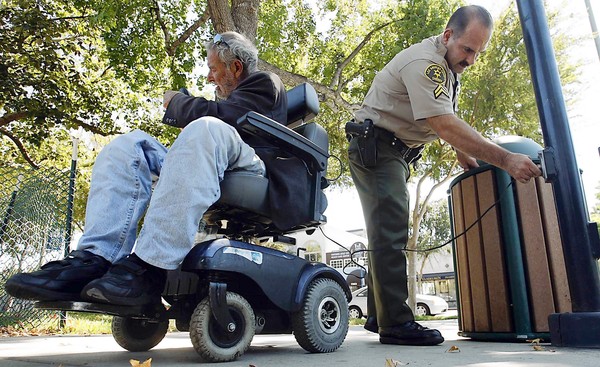
In West Hollywood, Los Angeles County Sheriff's Det. Greg Taylor helps a man recharge the battery
on his motorized wheelchair after pushing him across Santa Monica Boulevard. |
|
LA County sheriff's detectives fill in on patrol shifts
Up to eight hours of their work week can be spent on substitute duties to cut overtime, which forces them to drop their investigations and has resulted in a significant increase in unsolved crimes.
by Robert Faturechi, Los Angeles Times
October 1, 2010
Greg Taylor has risen to the rank of detective with the Los Angeles County Sheriff's Department — but on a recent afternoon the 12-year veteran was passing out parking tickets.
His first perp: a lithe West Hollywood woman with long blonde hair who parked her SUV in a spot for the handicapped. It's not that Taylor, who regularly investigates burglaries and thefts, has been demoted. Like most of the department's sworn personnel, he's now being forced to drop his regular duties and devote several hours a month filling in on routine patrols and low-level administrative tasks.
|
The new requirement is part of the cash-strapped department's effort to eliminate overtime and shed $128 million from its budget. It's drawn grumblings from many in the agency, but for station-level detectives, it seems to be having a significant impact on law enforcement.
Before budget cuts, there were just over 6,000 open cases assigned to station detectives, according to department records. By the end of August, that number swelled to 10,400. Sheriff's officials are linking that increase to the overtime curtailment program, dubbed Cadre of Administrative Reserve Personnel, or CARP.
"Station investigators are fulfilling their CARP obligations and, as a result, have less time available to investigate and close cases," Sheriff Lee Baca said in a recent report to the Los Angeles County Board of Supervisors. "It is expected that backlogs of open investigations will dramatically increase."
For many sworn personnel, the weekly hours they can devote to their regular duties has dropped significantly. Not only has overtime been slashed, but up to eight hours of their regular, 40-hour work weeks are being devoted to substitute shifts.
For detectives, those breaks can translate to leads cooling and investigations losing continuity.
Budget cuts, ordered earlier this year, have been felt widely, and department officials are becoming increasingly vocal about their consequences.
The cuts have been linked to a slowdown in 911 response times, a growing backlog in evidence analysis and the early release of inmates from county jails. The CARP shifts have saved the department $28 million since they began, said department spokesman Steve Whitmore.
For some detectives, the return to the physical demands of patrol duty has been a challenge.
"Two years behind a desk will make your uniform shrink," Taylor said. "At least that's what I have to tell myself."
On a recent sweltering Saturday in West Hollywood, the detective took on fender-benders and parking violators. He stopped at one point to help a man in a wheelchair with a dead battery cross the street to an electrical outlet where it could be recharged.
Riding down Fairfax Avenue, he came across a crew of neighborhood drunks lounging at a bus stop — one happily strumming his guitar. The group promised him they'd move along soon.
"I've arrested all three of them," Taylor said. "That was before I was a detective."
But he says he doesn't resent the lower-level tasks, calling them a preferable alternative to layoffs.
He cushions the loss in hours — about 10 a month, for now — by juggling tasks during his substitute shifts. During a recent patrol lull, he went out to the scene of a burglary he's investigating to take photos of the break-in.
"It's multitasking," he said. "We patrol and do detective work."
Some nights he takes crime reports home with him, and reads them during off hours.
"Yeah, it's unpaid," he said. "It helps me sleep though."
Although detectives at sheriff's stations are expected to take on the shifts, their counterparts at the sheriff's headquarters — including major crimes, homicide and child abuse detectives — were recently relieved of the responsibility.
Chief William McSweeney, who heads that division, said his detectives were taking on the shifts for a few months, but it was decided in mid-September that the lost hours were too burdensome.
"It created a slowdown in critical cases we couldn't stomach," McSweeney said. "It was very disruptive for crews that are already shorthanded."
"A detective is knee-deep in an investigation," he said. "And suddenly has to put on a uniform and work in a patrol car." |